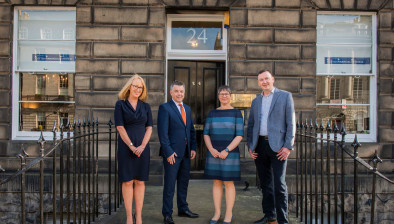SFE survey reveals tax disparity toll on Scotland’s financial sector

Increasing tax disparity with the rest of the UK is a predominant worry among senior leaders in Scotland’s financial sector is the increasing tax disparity with the rest of the UK, according to Scottish Financial Enterprise (SFE).
SFE’s inaugural tax and competitiveness survey, which sheds light on Scotland’s standing in the global financial arena, has shown 82% of respondents indicated that this divergence is hindering their capacity to attract and retain talent within Scotland.
The level of concern around attracting and retaining senior roles is acute. Half (50%) of respondents said they are ‘very concerned’ about their ability to attract or retain C-suite staff, while a further 28% are ‘concerned’.
The survey also highlights the strong foundations of Scotland’s business environment with 45% of respondents believing Scotland performs well or very well compared to the rest of the UK.
However, firms highlighted growing international competitiveness as a key risk, with 73% stating that Scotland performs ‘adequately’, ‘poorly’ or ‘needs improvement’ in comparison with other global financial centres.
Two thirds (66%) of firms were aware of specific instances were Scotland’s tax and business environment had made a negative impact on investment decisions.

Sandy Begbie
Sandy Begbie CBE FRSE, SFE chief executive, said: “These survey results provide valuable insight as to how our members view the competitiveness of the Scottish financial and professional services sector.
“Whilst there is a modestly favourable view of our industry in comparison to the rest of the UK, it is clear the current policy environment, particularly in relation to tax divergence, is causing significant concern in terms of attracting and retaining people.”
He continued: “Financial and professional services is already the largest sectoral contributor to Scotland’s economy, worth around £14.3 billion GVA annually, and employing nearly 150,000 people.
“Our sector growth strategy, backed by the Scottish and UK governments, underlines the opportunity to add between £4-7bn to the Scottish economy over the next five years but, in order to achieve this, it is vital Scotland offers stable and consistent policy environment that encourages investment.
“Our sector is one of only a very small number that can truly deliver material economic growth over the next three to five years, and policy alignment and business environment are vital to enable the delivery of that growth. We operate in a global market and must be globally competitive.”
He concluded: “We continue to work closely with both the Scottish and UK governments and these survey results will prove useful in future discussions as we seek to achieve long-term sustainable growth that will ultimately benefit the wider economy and society.”










